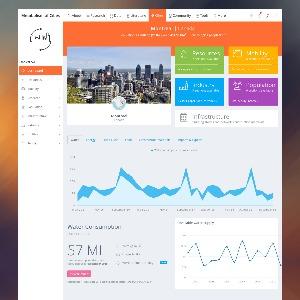
MultipliCity: Montreal Edition - crowdsourcing urban metabolism data by Metabolism of Cities
Please find below the
Finalist Evaluation
Judges'' comments
Judge 1
An ambitious proposition that aims to address one of the big challenges of moving toward a circular economy: data access! This project could help centralize a lot of various information to help a wide selection of stakeholders who create meaningful projects with real-life impacts. Comparisons with other cities is an asset to share and discover creative solutions to common problems. For the initiative to be successful, data access, quality and privacy will need to be assured to participants throughout the process.
Judge 2
Tools indicator to follow the transition toward circular economy and guide decision-making are essentials. Even though the collection of reliable data remains a challenge, the Multiplicity project seems to have a lot of potential and could be useful for many stakeholders in different ways.
Judge 3
Very interesting and ambitious approach. Similar "city scans" have been introduced and practiced - by Circle Economy, for example (Amsterdam, Glasgow, Rotterdam), Ellen MacArthur Foundation is also practicing Circular Cities Programme. Collaboration with listed organisations might lead to the more applicable solution. Several questions - like data protection - have to be explored. It is also not clear what kind of data shall be collected and who actually has access to this data. The project is very complex and might become complicated ... I would suggest "step by step" approach, starting on a smaller scale, testing the model, engaging stakeholders and than scaling up. Circular Economy based on collaboration and exchange of practices might be the right approach. All the best!
Semi-Finalist Evaluation
Judges'' ratings
| • | Novelty: | |
| • | Feasibility: | |
| • | Impact: | |
| • | Presentation: |
Judges'' comments
Judge 1 :
Unclear if the datasets gathered by students, researchers, citizens will be open access, how to ensure the data gathered is reliable and accurate, as well as aggregated to prevent privacy and confidentiality issues. There is a big challenge for datasets that are highly relevant but are confidential - approach doesn’t clarify how this data will be gathered. Scalability of this approach is unclear - how will the system enable comparability of Montreal data with other cities given data scalability and availability across different cities? Impact and feasibility are questionable.
Judge 2 :
Very clear, appealing and persuasive proposal. Although many cities are actually studying their own urban metabolism (Paris, Glasgow, etc.), the proposal is original in his way of collecting and sharing data. This approach is about collaboration and transparency, which are basic principles of a circular economy. These data would certainly be useful. Perhaps it would be interesting to have more information about the impact of the project on other cities, how it has already contribute to their transition toward a circular economy.
No comments have been posted.